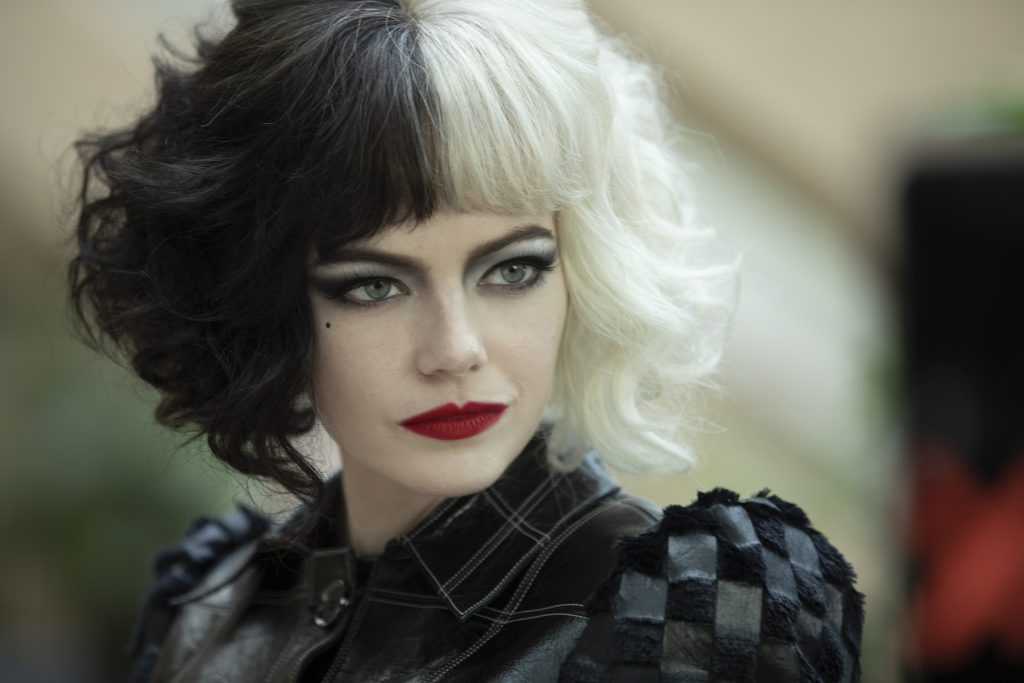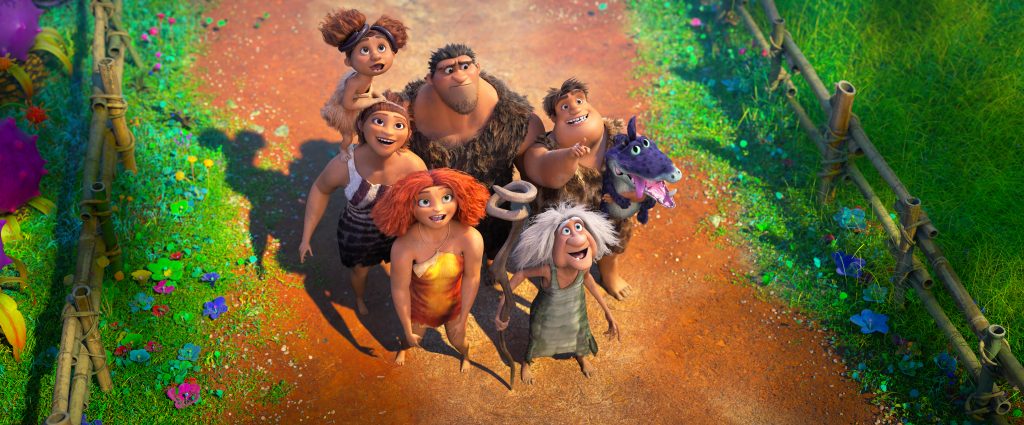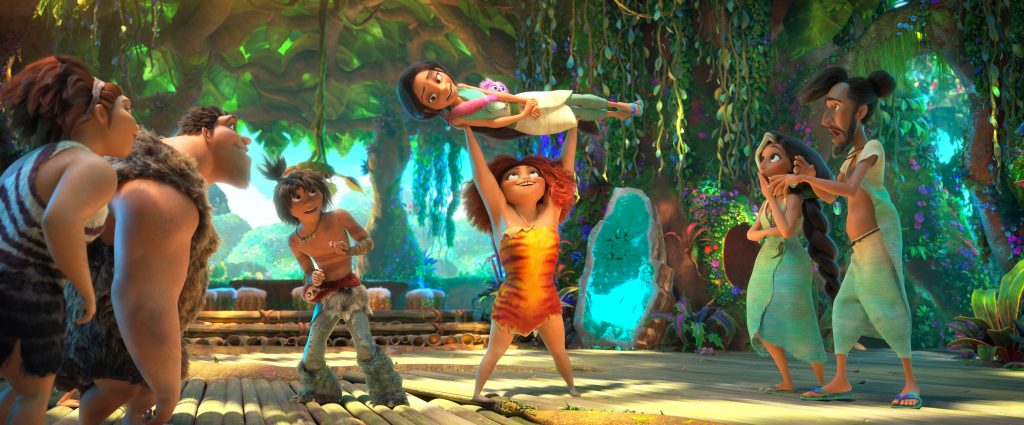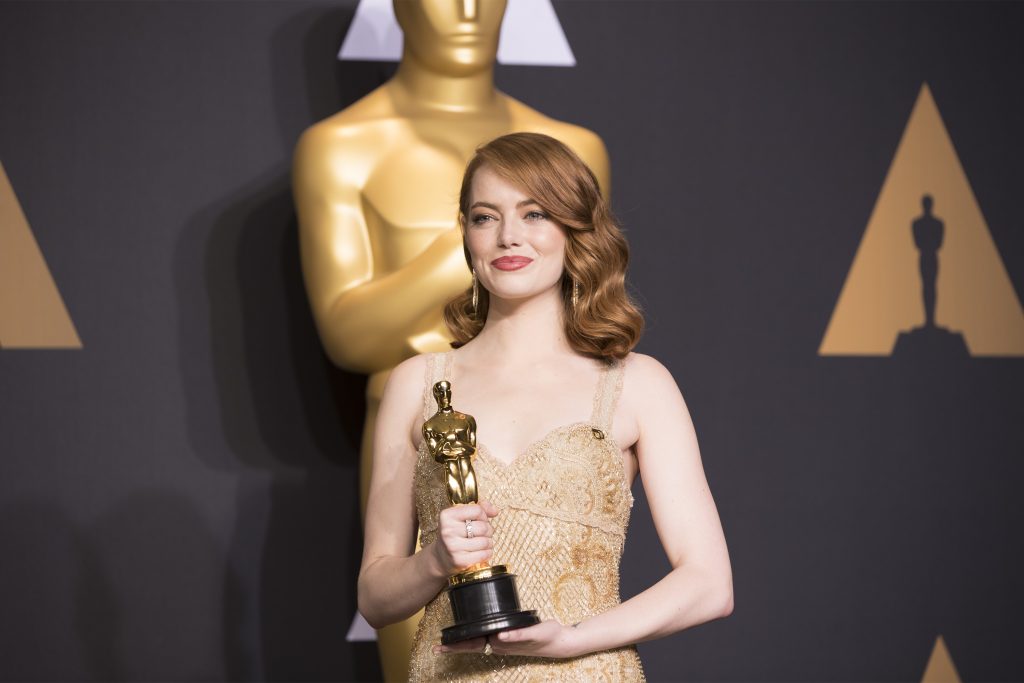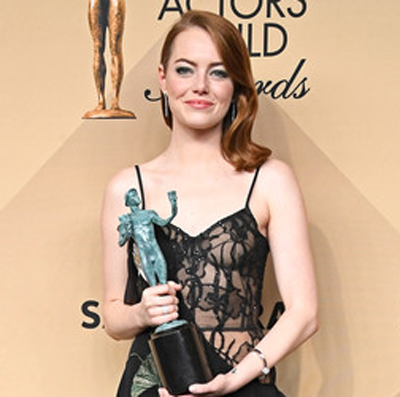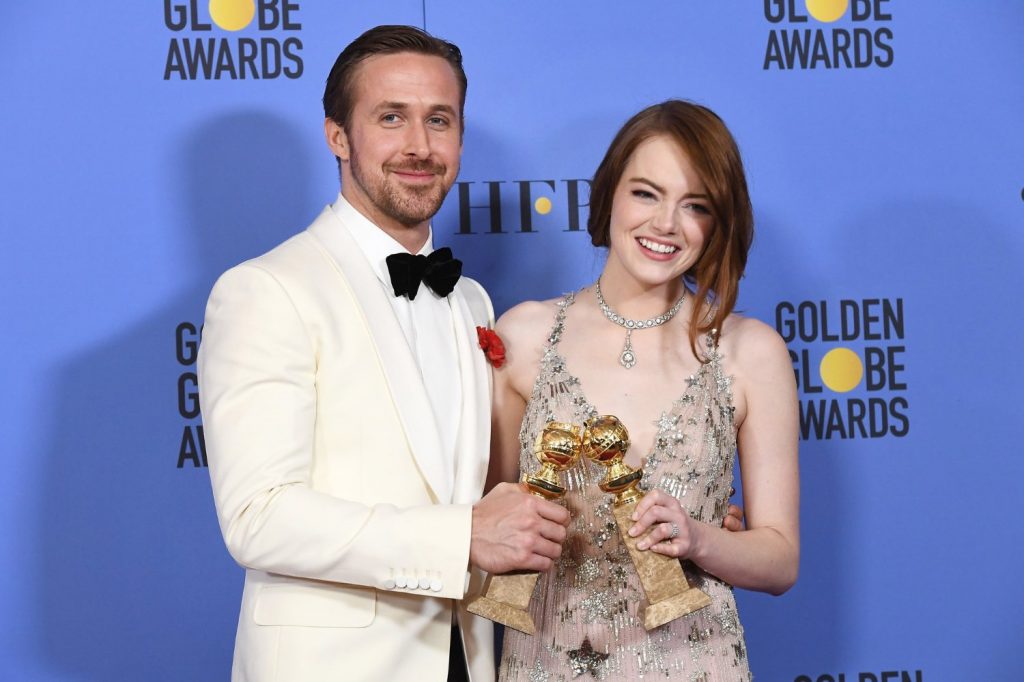October 8, 2023
by Carla Hay
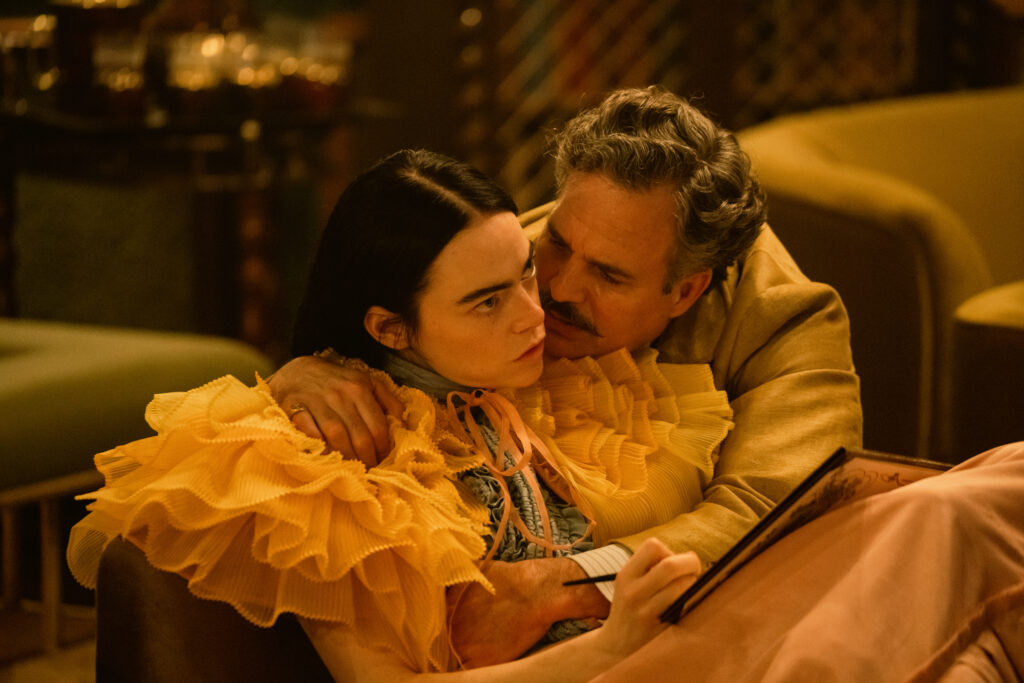
Directed by Yorgos Lanthimos
Culture Representation: Taking place in Europe and in Egypt, sometime in the 1890s, the fantasy/comedy/drama “Poor Things” (based on the novel of the same name) features a predominantly white cast of characters (with some Asians and black people) representing the working-class, middle-class and wealthy.
Culture Clash: A pregnant woman who committed suicide is re-animated from the dead by a scientist, who transplants her unborn child’s brain into her head, and she goes on journey of self-identity and exploring her sexuality, while most of the men she knows try to control her.
Culture Audience: “Poor Things” will appeal primarily to people who are fans of director Yorgos Lanthimos and star Emma Stone, as well as anyone interested in watching offbeat, sexually explicit and very artistic portrayals of human relationships.
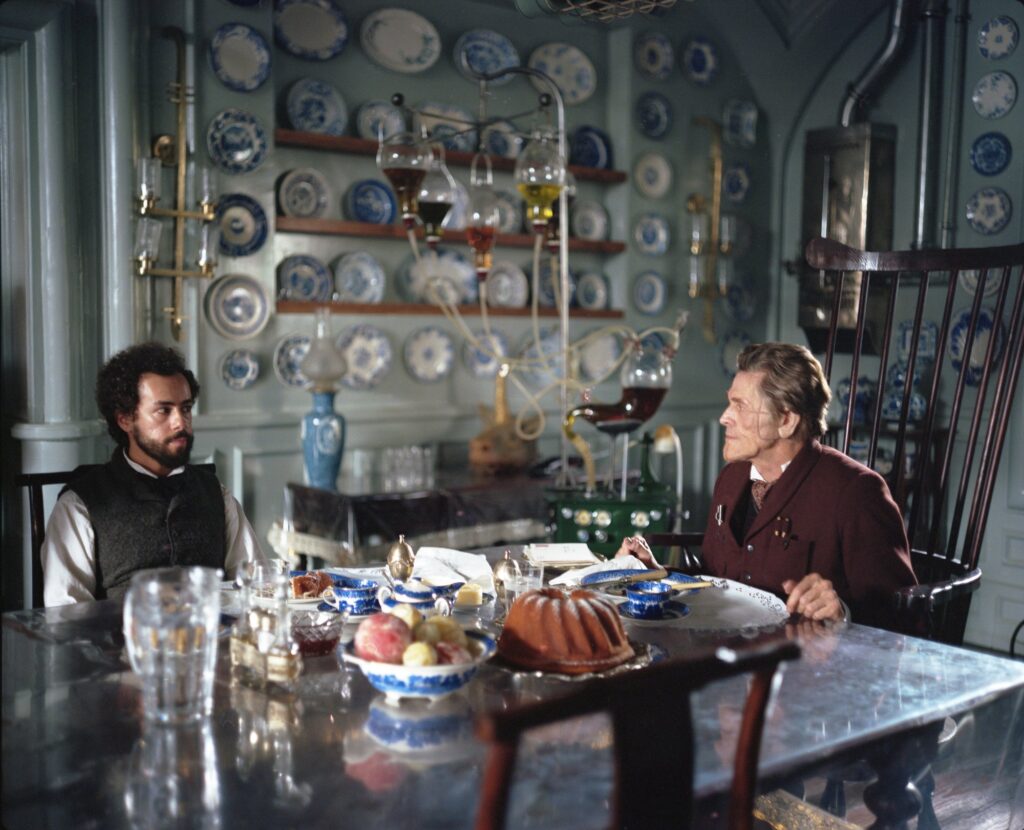
Bold and uncompromising in its vision, “Poor Things” is cinematic art at its finest. Emma Stone gives a tour-de-force performance in this enthralling and sometimes amusing story about power, control and independence in gender dynamics and female sexuality. Make no mistake: This movie is not for everyone. “Poor Things” isn’t appropriate viewing for people who are too young to watch or are easily offended by full-frontal nudity (male and female) in sex scenes. Many of the movie’s themes about personal freedoms versus society’s restrictions are meant to be thought-provoking, but some viewers won’t like the dark comedy or the way these themes are explored in sometimes unconventional ways.
“Poor Things” is the second movie collaboration between director/producer Yorgos Lanthimos, actress Stone and screenwriter Tony McNamara, after they previously collaborated on 2018’s “The Favourite.” Unlike “The Favourite,” which has an original screenplay, “Poor Things” is adapted from Alasdair Gray’s 1992 novel of the same name. “Poor Things” had its world premiere at the 2023 Venice International Film Festival, where the movie won the festival’s highest prize: the Golden Lion, which is the equivalent of Best Picture for the festival. “Poor Things” had its North American premiere at the 2023 Telluride Film Festival and has made the rounds at other film festivals in 2023, including the New York Film Festival and the Zurich Film Festival.
The “Poor Things” movie takes the book’s original setting of Scotland and relocates it to London. The movie’s story is told in chapters, according to whichever city the protagonist happens to be at the time. This protagonist is Bella Baxter (played by Stone, one of the producers of “Poor Things”), a woman with a mysterious past and living in a re-animated body whose age does not match the much-younger brain that she has in her head. Viewers of “Poor Things” are taken on a journey of Bella’s transformation as her brain and cognitive abilities begin developing and maturing.
The movie’s opening scene shows Bella jumping off of a bridge to commit suicide. It’s later revealed that Bella was pregnant when she jumped off of the bridge. A deeply troubled and controlling scientist named Godwin Baxter (played by Willem Dafoe) has rescued her and brought her back to his secretive lab in his isolated London mansion. He decides he will re-animate this mystery woman and transplant the brain of her unborn baby into her head. Godwin (who wants to be called God) gives this re-animated woman the name Bella. The movie shows whether or not Bella ever finds out about her re-animated origins.
Bella’s intelligence and knowledge develop at a rapid pace, but she still starts off with the maturity and brain power of an infant child. The infancy stage of her brain is not shown in the movie. When viewers first see Bella eating at a dinner table, she has the body of a woman but the mannerisms of a human who’s about 2 or 3 years old. She can eat, sit up, and stand on her own, but her body movements are often uncoordinated. She eats food with her hands when most people would use utensils to eat the same food. Her vocabulary is also very simple.
Godwin has no interest in teaching Bella a lot of society’s norms and etiquette, because he intends to never let Bella far from his sight. Godwin knows that what he is dong with Bella is a highly unethical and illegal scientific experiment, so he wants to keep Bella a secret at all costs. (Godwin does other transplants of body parts on animals, as evidenced by the pets on his property, such as a goat with a duck’s head and a chicken with a pug dog’s head.) As Bella’s brain matures, she becomes more curious about the outside world, but Godwin forbids her from going into the populated part of the city. At first, Bella views Godwin as a protective parental figure, but then she starts to feel resentment and rebel against his domineering control of her life.
Bella doesn’t have basic manners that people are taught when they become old enough to speak. Her “no filter” dialogue and actions are supposed to be among the movie’s funniest or the most uncomfortable moments. Bella has “grown up” watching Godwin do autopsies on people, so she develops a fascination with the human body. Later, Bella shows inclinations that she wants to become a medical examiner.
When she discovers masturbation by inserting objects into her vagina, it awakens Bella’s sexuality and becomes the catalyst for many things that occur during the rest of the movie. Because she has not been taught what is right or wrong when it comes to sexual acts, Bella grabs the crotch (out of curiosity) of Godwin’s loyal housekeeper Mrs. Prim (played by Vicki Pepperdine) in front of Godwin, who at least has the decency to tell Bella that she can’t grab people’s crotches without their consent.
Mrs. Prim is one of the few people who know Godwin’s secret about Bella. Godwin soon lets someone else in on his secret: a village doctor named Max McCandles (played by Ramy Youssef), who is hired by Godwin to be his research assistant/protégé and is sworn to secrecy about this job. Max is a polite gentleman who is immediately awestruck and infatuated with Bella. Max treats her with kindness and respect.
Before Max acts on his romantic feelings for Bella, he asks Godwin if Godwin has a sexual interest in Bella. Godwin assures him that he sees himself only as a father figure to Bella. Godwin also confesses to Max that Godwin is sexually impotent and has a traumatic past of being sexually abused by Godwin’s father. Godwin also has severe facial scars that look like his face had been slashed. Godwin says his father was the one who mutilated him.
In his own twisted way, Godwin wants to create a perfect family by keeping them confined to his mansion. And so, he encourages Max to court Bella and gives Max his blessing to propose marriage to Bella—on one big condition: Max can’t leave the mansion either after he marries Bella. Max agrees to this demand.
During this tender and sometimes awkward courtship, a brash and arrogant visitor comes into the household and throws these marriage plans into disarray. He is an attorney named Duncan Wedderburn (played by Mark Ruffalo), who has come to visit because he has the legal contract that Max must sign for Max’s marriage to Bella. At this point, Bella doesn’t fully understand what love is about, but she understands lustful sexual desire and how it can often be a way that some people manipulate others.
Duncan, who is a playboy bachelor, finds Bella to be very attractive and makes lecherous sexual advances on her. He also loves to brag about what a great lover he is. When he finds out that Bella is yearning to explore the outside world, Duncan promises to whisk her away on an adventure trip through Europe, beginning with Lisbon, Portugal. Despite the objections of Godwin and the heartbreak of Max, she eagerly accepts Duncan’s offer and goes away with Duncan.
During this trip, Duncan and Bella have a sexual relationship, but it’s not a relationship based on mutual respect. Duncan treats Bella like a sexual plaything, while she acts like a student who’s eager to learn. And even though Bella wanted to escape the possessive control of Godwin, she finds out too late that Duncan is even more possessive than Godwin. Duncan flies into jealous rages if he thinks that Bella might be sexually interested in other men.
Bella’s journey also takes her to a cruise ship going to Alexandria, Egypt, where she experiences more attempts by Duncan to control her life. During this cruise ship excursion, Bella meets a middle-aged wealthy woman named Martha Von Kurtzroc (played by Hanna Schygulla) and her platonic younger companion Harry Astley (played by Jerrod Carmichael), who give Bella a new, open-minded perspective that women and men can be friends with no sex involved. Martha tells Bella that she’s been celibate for 20 years and is content with having a life with no sex, which is a mind-blowing concept to Bella, who has been led to believe by Duncan that a woman’s primary purpose in life is to sexually pleasure men.
That doesn’t mean that Bella is willing to give up sex, because she likes sex a lot and wants to learn as much about sex as she can. But by coming into contact with a more diverse group of people with various lifestyles, Bella becomes more aware that she has many more options than she ever thought she had. One thing that hasn’t changed about Bella is her innate resistance to being confined and being told what to do with her life.
When Bella and Duncan are in Paris, she makes a life-changing decision that is an assertion of who Bella wants to be as a person capable of being in control of her own life. In Paris, she meets and befriends a heavily tattooed brothel madam named Swiney (played by Kathryn Hunter) and a brothel sex worker named Toinette (played by Suzy Bemba), who pass no judgments on any of Bella’s life decisions. Paris is where Bella truly blossoms. She is no longer trapped in a childlike or teenage mindset but expressing herself as a fully formed adult in her intelligence and emotional maturity.
Back in London, Godwin has moved on to finding another young dead woman to re-animate and control. He names her Felicity (played by Margaret Qualley), but this time, Godwin purposely wants to keep her passive, so he gives Felicity a brain where she probably won’t be able to think as independently as Bella can think. Max is still Godwin’s assistant, because Max is pining over Bella and hopes she will return to London and possibly get back together with him. Meanwhile, a military general named Alfred “Alfie” Blessington (played Christopher Abbott) shows up in the last third of the movie and causes yet another major change in Bella’s life.
“Poor Things” is truly a visual feast filled with a potpourri of great acting. Stone takes on the role of Bella with pure gusto that never gets overly hammy but looks organic and genuine to the Bella character. Aside from the physical demands of this role, the emotional arc that Stone shows in Bella’s evolution is absolutely exceptional. Ruffalo, Dafoe and Youssef also give high-quality performances, while Newton makes a memorable impact in the short amount of screen time that she has the movie.
“Poor Things” will get inevitable comparisons to “Frankenstein,” but the biggest difference in each story’s re-animated character is that Dr. Frankenstein’s creation never has a brain that develops beyond a child-like level. Frankenstein’s monster also never has to deal with the minefield of sexual demands and discrimination that Bella experiences, simply because she’s a female. Even though “Poor Things” is not a horror story like “Frankenstein” is, “Poor Things” holds up a gilded mirror to society to show a different type of horror story: The problem of people trying to control and dictate what women do with their own bodies and with their own lives is not oppression that is stuck in the 1890s but is still very much going on today, with no end in sight.
Aside from the gender issues about sexuality, “Poor Things” has astute observations about gender issues and financial freedom. There comes a point in time when Bella finds out that men aren’t the only people who can choose what to do to make money. Bella also makes a big decision in Alexandria when she is confronted with the harsh realities of poverty and income inequality.
In “Poor Things,” the stunning cinematography by Robbie Ryan (who uses a lot of “fish eye” lens camera work), exquisite production design by Shona Heath and James Price, and the gorgeous costume design by Holly Waddington all give the movie the look of a fantastical Gothic Revival alternate universe that takes place in the 1890s but with touches of modern flair. It’s a world that sometimes looks like a picture book come to life. The movie bursts with sumptuous hues and settings that evoke an “Alice in Wonderland” for adults.
However, Bella’s story is not presented as a typical female-oriented fairy tale where her ultimate goal in life is to find someone to be her soul mate/love partner. She begins to understand that she doesn’t have to be dishonest about herself in order to please others. And if she happens to find true love, it’s only worth it when mutual respect is part of the relationship. “Poor Things” is a work of fiction, but it shows the realities of how society can be both vulgar and civil, how life can be filled with pleasure and pain. It’s a cinematic experience like no other and has cemented itself as one of the best movies ever made by this talented principal cast, crew and other filmmakers.
Searchlight Pictures will release “Poor Things” in U.S. cinemas on December 8, 2023.

